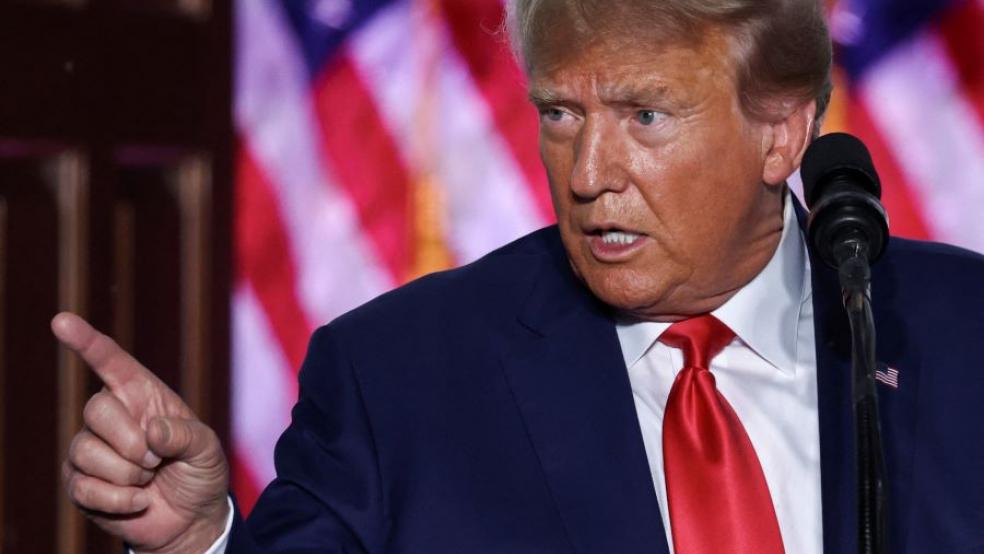Former President Donald Trump has been busy with his criminal trial in Manhattan over the past few weeks, but he has still found the time to meet with donors in his quest to return to the White House next year. According to The Washington Post’s Josh Dawsey, Trump has used his meetings with wealthy supporters to drum up exceptionally large contributions, while sometimes attaching his requests for money to promises that he will cut taxes or otherwise pursue policies that benefit the likes of oil company executives.
Trump’s approach has been both aggressive and notably transactional, Dawsey reports. In a recent meeting with major donors at the Pierre Hotel in Manhattan, Trump said that a businessman had offered a $1 million donation to the Republican frontrunner’s campaign, while stating a desire to have lunch with the candidate. Trump indicated that he wanted a much larger donation. “I’m not having lunch,” Trump reportedly told the group. “You’ve got to make it $25 million.”
After making it clear that he expects to receive exceptionally large donations from his wealthiest supporters, Trump pivoted to fiscal policy, telling the group that a victory by President Joe Biden would mean higher taxes after 2025, when many of the tax cuts signed into law in 2017 are set to expire. “The tax cuts all expire for wealthy and poor and middle-income and everything else, but they expire in another seven months and he’s not going to renew them, which means taxes are going to go up by four times,” he said. “You’re going to have the biggest tax increase in history.”
The description of the meeting is consistent with a report earlier this month that Trump had asked a group of oil executives gathered at his Mar-a-Lago Club in Florida to raise $1 billion for his campaign while promising to reverse Biden’s environmental regulations – an arrangement that would be a “deal” for the supporters, given the magnitude of the potential savings.
Dawsey reports that Trump’s “remarkably blunt and transactional” approach is raising legal questions. “By frequently tying the fundraising requests within seconds of promises of tax cuts, oil project infrastructure approvals and other favorable policies and asking for sums more than his campaign and the GOP can legally accept from an individual, Trump is also testing the boundaries of federal campaign finance laws,” Dawsey writes.
A potential clash over environmental policies: Although there are certainly plenty of oil executives eagerly looking forward to looser regulations in a second Trump administration, some major Republican-leaning players in Washington may have other plans. Politico’s Kelsey Brugger reports that the U.S. Chamber of Commerce and the American Petroleum Institute could end up defending some portions of Biden’s signature environmental legislation, the Inflation Reduction Act, from Republican attacks, should Trump regain the White House.
While both groups have opposed stricter environmental rules, the Inflation Reduction Act contains some provisions the corporate interest groups like, including massive tax breaks for manufacturing and green energy technologies. “Oil companies in particular have expressed interest in potential business opportunities offered by the climate law, such as projects that would produce hydrogen fuel and capture and store carbon dioxide,” Brugger writes.
Mike Sommers, president and CEO of the American Petroleum Institute, said partisanship will not get in the way of policies the industry supports. “We’ll work vigorously to ensure that the provisions that we support in the IRA sustain during a potential Trump administration,” he told Politico. “This has always been a bipartisan organization. The industry is bipartisan.”
Still, there is much in the Biden environmental agenda that could be swept away in the event of a Trump victory. Republicans have grown increasingly hostile to electric cars, which have received a variety of subsidies in the Biden legislation, and Trump has long spoken of his strong dislike for wind power.
On the other hand, despite Trump’s grand promises, it’s not clear how much power corporate interest groups who opposed Trump will have, or exactly what environmental policies a new Trump administration would pursue. Tom Pyle, a former oil industry lobbyist who leads the American Energy Alliance, said there is still enormous uncertainty about the possible change of the guard in the White House. “It’s Donald Trump — you never really know,” he told Politico.




